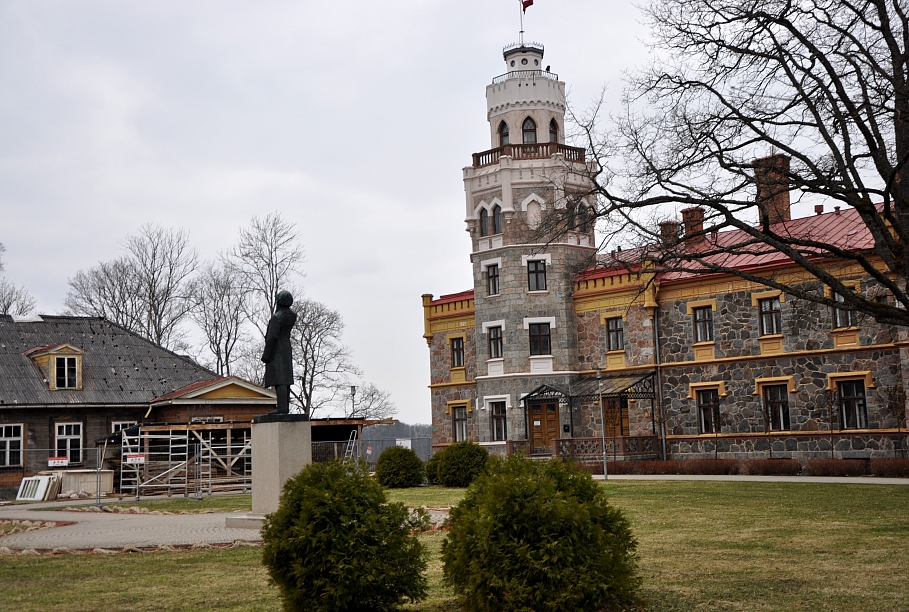I did my best but was of very little help, with my only really worthwhile contribution being a list of ways to identify freeloading foreign journalists who think they can get a free holiday and a goody bag of chocolates and Black Balzams by writing some copy/pasted tourism blurb on their personal blog pages.
It's amazing how many people still think they can hoodwink an entire country with a bogus promise of fame. At times one expects them to pull out a pair of Levi's 501s and watch as we all fall to our knees in awe at their advanced civilization.
I was able to suggest a reasonable variety of detection and humiliation techniques to weed out these interlopers. I am, after all, a Latvian taxpayer and the last thing I want to do is subsidize people like myself.
On the more difficult question of how to get the small number of genuine journalists to tell the world about 100 Years Of Latvia, I was of less help, largely because I did not want to say the brutal truth: "No-one apart from Latvians is particularly interested in Latvia's centenary, so maybe get them writing about something else and just hope they mention it."
If only the meeting had taken place a day later! Then I could have walked into the Latvian Institute with a list of feature ideas as long as Kristaps Porzingis' arm. For within 24 hours, Latvia was all over the international media as a result of its groundbreaking academic research.
For the full background, read this previous story, which opened my eyes to entirely new possibilities for generating coverage of Latvia.
It's important to point out that what we are talking about is not FAKE NEWS, which is thoroughly disreputable and despicable. This is REAL FANTASY, which in the post-truth world has replaced news as the backbone of the media.
In the old media, basing a story on fictitious quotes from a fictitious person from a fictitious university about fictitious research conducted on fictitious mice would have presented a problem.
That is no longer the case. Despite having proven beyond doubt that the whole thing was made up, sources around the world continued recycling and disseminating the happy news that gin is good for you partly because academics in Latvia say so but largely because they want it to be true.
As far as the internet (and therefore posterity) is concerned, the research happened, the university exists and we must buy a bottle of gin on the way home.
One reaction to this, by those with an inflexible attitude to probity might be to throw up our hands and wail about the death of truth. But to the entrepreneurially-minded modern media operator, this represents an exciting new opportunity.
Therefore I have drawn up a few post-truth story suggestions for visiting journalists to cover. These are based on rock-solid principles of what sells and all are backed up by actual fictitious academic research:
Holy Grail 'probably' discovered in Balvi A chalice dating from the first century BC and likely of Levantine origin has been dug up by a man named Maris Pipers while he was planting potatoes in the small town of Balvi. Latvian potatoes are planted particularly deep. University of Sigulda archaeologists are working to preserve the chalice, which has the initials 'JK' scratched into its base and shows some evidence of having contained Sumerian wine. The archaeologists have made some slightly fuzzy photos available to the press. Coincidentally the word 'Balvi' derives from an ancient Aramaic word meaning "place where the drinking cup of the lord is secretly buried" and DNA tests of the local population reveal them to have a high number of hyperallergenic semitic liposomes, suggesting they may be descended from a lost tribe of Israel. Latvian air confirmed as world's sexiest Breathing the air in Latvia for just one week is equivalent to consuming half a tablet of Viagra and could boost your sexual pleasure by as much as 11%, University of Sigulda researchers have discovered. Boffins took two groups of rabbits, made one group breathe canned air from the world's major metropolises for six months and let the other group breathe unfiltered Latvian air. The results were conclusive: the metrosexual rabbits had reduced libido, fussy eating habits and developed an unhealthy interest in modern art, based on pictures of Pablo Picasso and Piet Mondrian shown to them at hourly intervals. In contrast the Latvian air-breathing rabbits spent more than 40% of their waking hours and 20% of their sleep time engaged in mating and showed almost complete disregard for the works of Max Ernst and Francis Bacon. They were however, quite interested in Mark Rothko, who was born in Daugavpils. As a result of the research Doctors from the University of Sigulda's medical faculty are now prescribing romantic weekend breaks in Latgale for couples wanting to put the spice back into their sex life. However, lead researcher Professor Romeo Casanova warned that lots more research on human subjects was required before full results could be published, and that his team of blondes. brunettes and redheads of both sexes was working day and night to make them stand up. Linseed oil 'the new oil' Experts, scientists and other highly qualified professionals with many certificates from the world-famous University of Sigulda have synthesised a new form of oil from linseed which is set to revolutionize every industry. Linseed oil has been produced in Latvia for centuries, but only now are its full potentialities being unlocked courtesy of pioneering work at UniSig's Institute of Advanced Tautology in Olaine. By cold-press filtering the same oil multiple times using increasingly small macro-micro-filters and then recombining the different grades into a superheated centrifugal graviton, the inherent properties of the oil are magnified to the power of four and, in some cases, to the power of seven. Scientists are still refining their refining techniques but hopes are high that within 10 years, a liter of 'Olaine Oil' will be able to power an articulated truck for 250,000 kilometres, fuel a train for 1,500 kiolmetres, remove pollutants from 900 liters of rainwater and slow the speed of Bergsonian time by as much as a quarter. The oil is also believed to be useful in inducing placebic aromatherapy cures among people who don't believe in science and feel like they want to do something for the planet. Meanwhile UniSig's food scientists claim french fries sprayed with a minute amount of Olaine Oil and shot with UniSig's high-power pulse lazer, which is capable of piercing up to 120mm of armor plate, are up to 70% crisper than conventional fries.

































